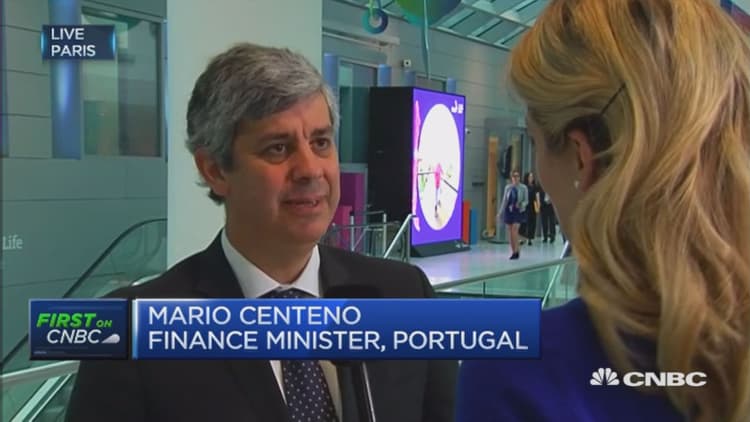
Portugal's finance minister has urged policymakers and investors to be patient as the country tackles its burgeoning debt issue and sluggish economic growth.
"The good thing about the debt is that it has been falling since 2014, we have been able to put the debt over GDP (gross domestic product) ratio on a decreasing path … we are working very hard on the public finances dimension to curb the deficit … this is the main role of the government in that respect," Portuguese Finance Minister, Mario Centeno, told CNBC in an interview on the outskirts of the OECD meeting in Paris on Tuesday.
"Patience is of the essence at this moment. The country … went through an adjustment process, very strong in its public finances. It has an impact, for example it had huge flows of migration, out migration, that reduced the labor force, we need to stop that process and put all the forces, the internal forces of the country to work. And it takes time, we do understand that. The reforms to materialize they need time."
Portugal has been struggling with a heavy debt load and sluggish economic growth. GDP is expected to be flat this year, according to European Commission forecasts. Debt is near 130 percent of GDP, one of the highest in the euro zone.
"Certain reforms that the government made in the last years gained momentum and have the possibility to materialize its impact and boosting GDP…the two effects, fiscal consolidation and the economy gaining some momentum will be key to the debt issue," Centeno added.
The country's left-leaning anti-austerity ruling coalition - led the Socialist Party - was elected in November and has not had an easy ride so far amid a tricky relationship with European Union (EU) lawmakers. Lisbon and Brussels tussled over the Portuguese 2016 budget which fell short of EU rules. Eventually a compromise was found.
In May, the European Commission softened its stance towards Portugal and offered it and Spain extra time to bring their budgets in line with EU rules. The Commission also did not fine Portugal for breaking EU fiscal rules and gave them an extra year to conform to EU budget rules. Portugal agreed to cut the deficit to 2.2 percent of GDP in its 2016 budget.
"We have a specific target for the deficit … and that will tackle the European Commission wishes for fiscal consolidation which are in the government program so it's not something that is strange to our policy. And it's true that we need also to make sure that whatever is related with the government, it is working towards the goal of improving the capacity to grow of the Portuguese economy," Centeno told CNBC.
Banking issues
Like several of its euro zone counterparts, Portugal is also struggling with issues in its banking sector. Last week, Spanish newspaper El Pais reported that Caixa Geral de Depositos, the country's biggest lender which holds nearly a third of the nation's deposits, was in need of recapitalization to the tune of 4 billion euros ($4.45 billion).
Centeno confirmed that the bank does need a cash injection, but said the government is "still discussing" the exact amount.
"That's the purpose of the operation, is to make Caixa a strong bank who is able to finance the economy because that's one of the issues that we also need to make sure is operational, meaning we need financing for the economy and the banking system is key for that," Centeno told CNBC.





